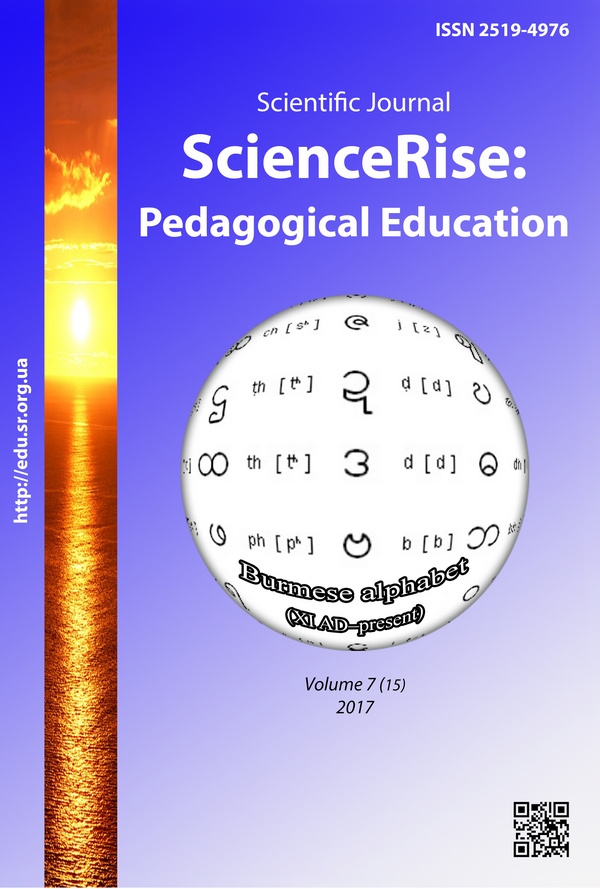The determination of structural components of readiness of primary school teachers to the use of learning-playing technologies
DOI:
https://doi.org/10.15587/2519-4984.2017.107982Keywords:
learning-playing technologies, structural components of readiness, playing activity, teacher’s professional activityAbstract
The structure of the readiness of students of the specialty “Primary education” to the use of learning-playing technologies was characterized in the study and its following components were separated: motivational, cognitive and operational. The brief analysis was each component was given. It was determined, that the motivational component reflects the moral-psychological student’s readiness to the pedagogical activity and is characterized by the student’s motivation to the learning-cognitive activity and participation in the process of this competence formation, interest of a future teacher to the pedagogical activity of teaching school subjects in primary classes, and also a self-estimation of the professional training and its correspondence to optimal professional examples. It was explained, that the cognitive component characterizes general pedagogical, methodical and special (playing-technical) knowledge and also pedagogical (terminal and instrumental) values. It was demonstrated, that the operational component consists of pivotal components as general pedagogic, methodical and special (playing-technical) skills, necessary for attaining a quality and high results of the professional pedagogical activity
References
- Rudyk, P. A. (Ed.) (1974). Psyhologiya. Moscow: Fizkultura i sport,. 512.
- Shadrykov, V. D. (1996). Psihologiya deyatel'nosti i sposobnosti cheloveka [Psychology of human activity and abilities]. Moscow: Logos, 320.
- Slastenyn, V. A., Kashirin, V. P. (2010). Psihologiya i pedagogika [Psychology and Pedagogy]. Moscow: Akademiya, 480.
- Dyachenko, M. Y., Kandybovich, L. A. (1976). Psihologicheskie problemy gotovnosti k deyatelnosti [Psychological problems of readiness for activity]. Minsk: BGU, 176.
- Durai-Novakova, K. M. (1983). Formirovanie professional'noy gotovnosti studentov k pedagogicheskoy deyatel'nosti [Formation of professional readiness of students to pedagogical activity]. Moscow, 32.
- Gavrysh, I. V. (2006). Teoretyko-metodologichni osnovy formuvannya gotovnosti maybutnix uchyteliv do innovaciynoyi profesiynoyi diyalnosti [Theoretical and methodological foundations of forming the readiness of future teachers for innovative professional activities]. Kharkivskyi nats. ped. un-t im. H. S. Skovorody. Kharkiv, 579.
- Dychkivska, I. M. (2012). Innovaciyni pedagogichni tehnologiyi [Innovative Pedagogical Technologies]. Kyiv: Akademvydav, 349.
- Koval, L. V. (2009). Profesiyna pidgotovka maybutnix uchyteliv pochatkovoyi shkoly: tehnologichna skladova [Professional training of future teachers of elementary school: technological component]. Donetsk: Yugo-Vostok, 375.
- Slastenyn, V. A., Ysaev, Y. F., Myshhenko, A. Y., Shyyanov, E. N. (1997). Pedagogyka [Pedagogy]. Moscow: Shkola-Press, 512.
- Kremen, V. G. (Ed.) (2008). Encyklopediya osvity [Encyclopedia of Education]. Kyiv: Yurinkom Inter, 1040.
- Goncharenko, S. U. (1997). Ukrayinskyi pedagogichnyi slovnyk [Ukrainian Pedagogical Dictionary]. Kyiv: Lybid, 376.
Downloads
Published
How to Cite
Issue
Section
License
Copyright (c) 2017 Marina Marko

This work is licensed under a Creative Commons Attribution 4.0 International License.
Our journal abides by the Creative Commons CC BY copyright rights and permissions for open access journals.
Authors, who are published in this journal, agree to the following conditions:
1. The authors reserve the right to authorship of the work and pass the first publication right of this work to the journal under the terms of a Creative Commons CC BY, which allows others to freely distribute the published research with the obligatory reference to the authors of the original work and the first publication of the work in this journal.
2. The authors have the right to conclude separate supplement agreements that relate to non-exclusive work distribution in the form in which it has been published by the journal (for example, to upload the work to the online storage of the journal or publish it as part of a monograph), provided that the reference to the first publication of the work in this journal is included.








